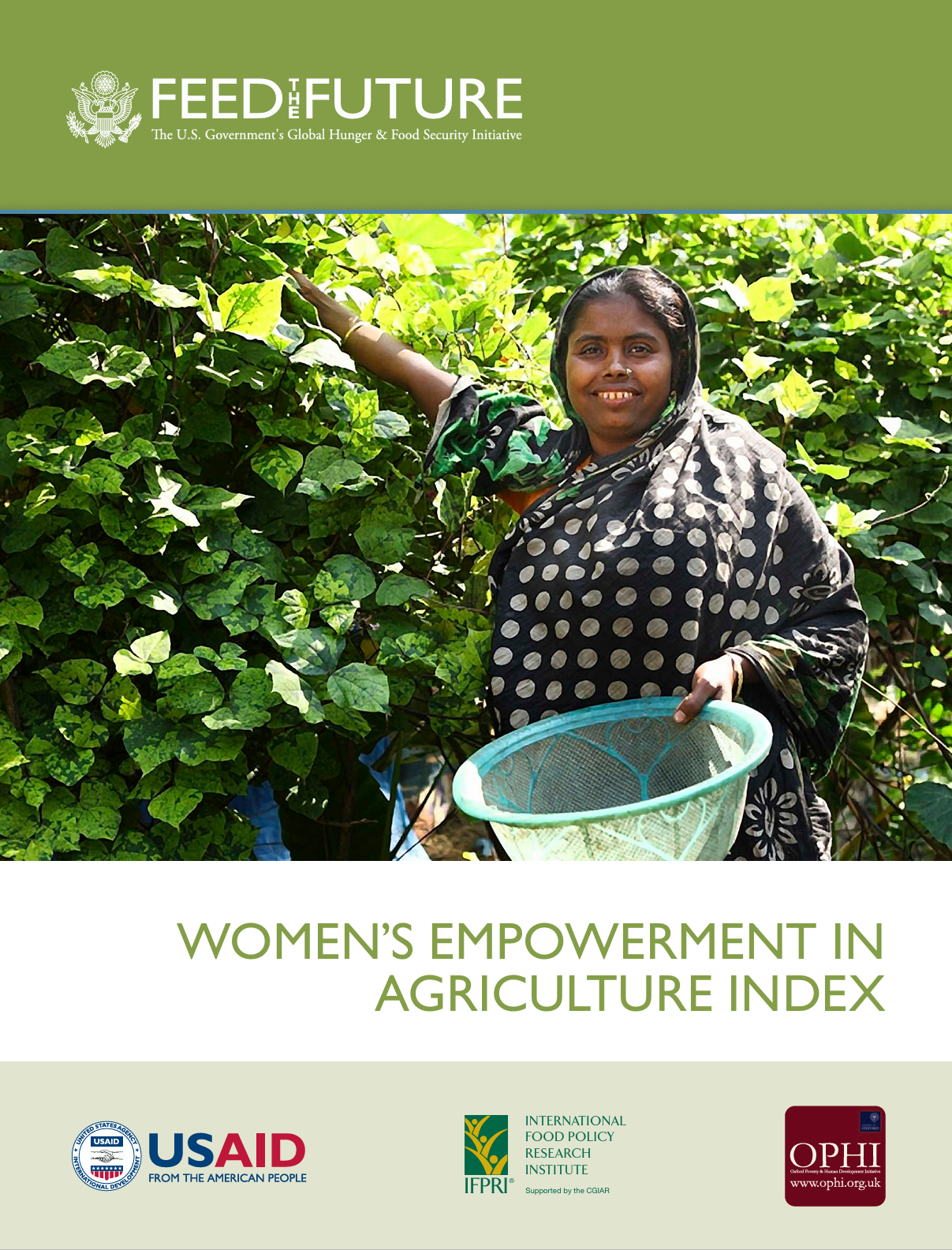The Women’s Empowerment in Agriculture Index - an introduction
The Women’s Empowerment in Agriculture Index (WEAI) is a ground-breaking tool to measure the empowerment, agency and inclusion of women in the agriculture sector.
Launched in March 2012 by OPHI with the United States Agency for International Development (USAID) and the International Food Policy Research Institute (IFPRI), the WEAI tracks women’s engagement in agriculture in five areas: production, resources, income, leadership, and time use. Unlike any other tool, it also measures women’s empowerment relative to men within their households, providing a more robust understanding of gender dynamics within households and communities.
The WEAI was developed to track the change in women’s empowerment levels that occurs as a direct or indirect result of interventions under Feed the Future, the US government’s global hunger and food security initiative. In May 2014, the U.S. Government’s global hunger and food security initiative, Feed the Future, launched the Women’s Empowerment Global Synthesis Report. The report provided a comprehensive analysis of the WEAI baseline survey results for thirteen countries and summarised both findings from the survey and the relationships between the WEAI and various outcomes of interest to the US Government’s Feed the Future initiative.
What is the WEAI?
Women play a critical and potentially transformative role in agricultural growth in developing countries, but they face persistent obstacles and economic constraints limiting further inclusion in agriculture.
The WEAI measures the empowerment, agency, and inclusion of women in the agriculture sector in an effort to identify ways to overcome those obstacles and constraints. The Index was a significant innovation in its field and aims to increase understanding of the connections between women’s empowerment, food security, and agricultural growth.
The WEAI is a composite measurement tool that indicates women’s control over critical parts of their lives in the household, community, and economy. It allows us to identify women who are disempowered and understand how to increase autonomy and decision-making in key domains. It is also a useful tool for tracking progress toward gender equality.
What was OPHI’s role?
OPHI developed the original WEAI from the survey data and adapted the Alkire-Foster method, which underpins the Index. Feed the Future, through support from USAID, defined the five domains, provided technical input on the development of the pilot survey, and provided overall policy guidance for the Index, which was commissioned to support the monitoring and evaluation of their programs. IFPRI provided overall coordination for this project, designed and implemented the household pilot survey, and developed the individual case studies, working with in-country collaborators. IFPRI have subsequently continued to develop multiple versions of the WEAI for different purposes.
- Watch a short film about WEAI about why the WEAI was created and how it can be used. The film includes interviews with representatives of OPHI, USAID and IFPRI, and presents the findings of the pilot studies that were conducted in Bangladesh, Guatemala and Uganda.
- See also a video and presentation about how WEAI is constructed and a video about how to calculate the WEAI using the .do files.
- Listen to an audio recording of Sabina Alkire explaining the WEAI autonomy module, questions G03a–G035 (11 July 2012).
Development of the WEAI
Since its original release, the WEAI has been developed to create four different versions for different purposes. In 2015, the Abbreviated WEAI (A-WEAI) was launched to modify questions that were difficult to implement in the field and shorten the interview length. In 2018 a PRO-WEAI was developed to measure agriculture development projects and added specialized modules together with new qualitiative tools to understand local definitions of empowerment. A project-level WEAI for market inclusion (pro-WEAI+mi) was introduced to measure empowerment across the value chain.
For more information on versions of the WEAI
How can I find out more?
- Full WEAI brochure
- OPHI Working Paper 58, ‘The Women’s Empowerment in Agriculture Index’
- Download the Women’s Empowerment Global Synthesis Report launched in May 2014
- Download the pilot survey modules and handbook
- Download the ‘Calculating the WEAI’ (.do file)
- Download the ‘WEAI data preparation’ (.do file)
- Development Horizons blog post
- USAID blog on the WEAI
- IDB blog on the WEAI
- Launch events at the UN and Houses of Parliament
WEAI Case Studies
| Uganda | Peace | Florence | Harriet | Lilian |
| Bangladesh | Aysha | Seema | Nadia | Naju |
| Guatemala | Angela | Maria | Ingrid |
The Alkire-Foster method is protected by copyright. The Women’s Empowerment in Agriculture Index (WEAI) is also protected by copyright. Under a special arrangement, the copyright for the WEAI is jointly owned by Oxford University and the International Food Policy Research Institute, and any use should be for not-for-profit only.
If you are interested in using the WEAI or any of the family of Alkire Foster methods commercially, please contact the Oxford Poverty and Human Development Initiative (OPHI) at the University of Oxford to negotiate a license.



